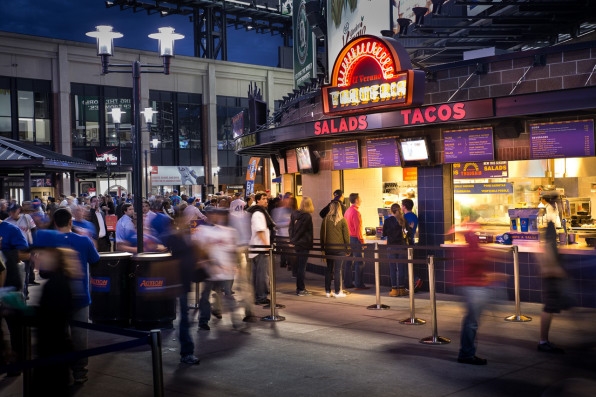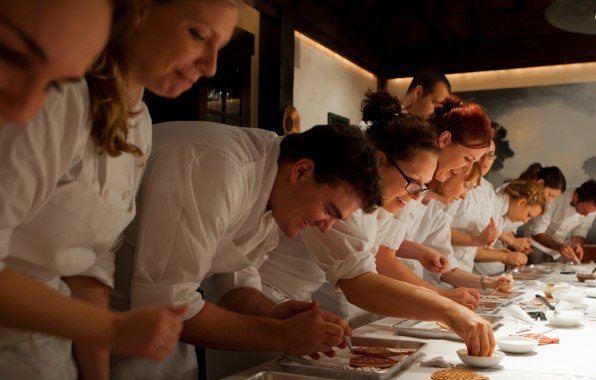You may not think about this after a satisfying meal at your favorite restaurant, but your tip typically goes just to your waiter and does not include the chef who prepared your meal, the maitre d’ or the dishwasher, all of whom were involved in creating your dining experience.
Danny Meyer, CEO of Union Square Hospitality, who has launched some of the most successful restaurants in New York city, from the Modern to Shake Shack, wanted to do something about this even if it meant taking on the entrenched compensation system that pervades the restaurant industry.

Removing Tips
Over his two decades in the industry, Meyer had seen the tipping culture have what he saw as a negative impact on the careers of his employees, who get stuck in frontline roles and never grow out of them because management positions would require a 25% pay cut. Despite the fact that you gain a lot in base compensation when you move to an entry-level manager position, you do lose out on making tips via guests; if you were making a lot of tips, it can affect their total compensation.

“They wake up in some cases some 20 years later and realize they sort of missed the boat. The tipping system in America has been like a bad drug,” says Meyer. And it’s not just waitstaff not advancing. Meyer also points to the fact that, in many states, tips can’t be shared with cooks or other staff unless they spend at least 80% of their time facing the customer, “The system has effectively kept cooks in a place where they make 10 times less per hour, in many cases, than tipped employees.”
Over the last couple of years, Meyer has eliminated tips in nine of the 14 restaurants he owns, increasing the prices on the menus by the cost of the average tip. In announcing the change to his customers in a letter he said, “Once these changes are implemented, the total cost you pay to dine with us won’t differ much from what you pay now. But for our teams, the change will be significant. We will now have the ability to compensate all of our employees equitably…And by eliminating tipping, our employees who want to grow financially and professionally will be able to earn those opportunities based on the merit of their work.”
When I asked Meyer how the change has turned out, he says when you make such a sweeping move across your business you have to make sure everyone is listened to, including your customers and your staff, “Our first priority was engaging and educating our own team in this conversation through a series of internal townhalls, so that they could be genuine ambassadors of the change. We started the conversation about “Hospitality Included” with our own people months before we made the news public or implemented it in any of our restaurants.”
They also had to educate their customers on why paying higher prices for your meal and not tipping was a more sustainable way of doing business. “Before the launch, we hosted town halls in which our guests had the opportunity to ask questions and share feedback. We discussed the change on social media and other marketing channels, we used clear language in on-site signage and menus, and we made sure to communicate with our guests when they made a reservation, when they arrived at the restaurant, and yes, when they sat down at the table.”
Each restaurant where they eliminate tips goes through a fundamental change to set up the new compensation model for their staff. “So of course we approach these roll-outs thoughtfully…in a process which typically takes three to six months,” adds Meyer. Several of their remaining businesses, which have yet to eliminate tips are more casual and have lower price points. In these cases, Meyers says price increases are potentially felt more significantly so that’s a consideration they take into account in rolling out the change more gradually.
Under the new compensation system, Meyer’s restaurants have increased the pay for their cooks by 20%. The move quickly addressed a shortage of cooks that the company had faced previously. But it also created new problems with recruiting waiters in a competitive job market, and it has cost them millions in tax benefits tied to having a tip-based compensation model.
At first income shrunk and management needed to re-educate their guests to understand that higher menu prices didn’t mean they were paying more for the meal when they signed their check, “Even though everybody knows they’re going to take an extra $20 out of their pocket at the end of the meal, most people don’t do the reverse math. There were customers who were like, ‘How can I go to your restaurants if I can’t punish bad service?’ Or ‘How can I go to your restaurants if I can’t give a nice reward for good service?’ So you potentially put your business in jeopardy when you’re trying to do the right thing.”
When I asked Meyer if it had been a profitable move he says, “Our investors are patiently waiting because they believe that this is an investment in doing the right thing that will create a professional career path [for our employees]. They also believe as I do, because I’ve tried to convince them, that each time minimum wage goes up, which it now has for two consecutive years since we initiated this, we are immune because we’re paying way over minimum wage absent tips.”

Hiring for Purpose
How do you persuade your waiters to forgo a 20% tip on each table they serve? Meyer says they never wanted to hire people who would only have been nice to you if they assessed it out of the four tables in their section, you were the richest or you were the most generous. “I would never want someone on our team who would go through that calculus. To say, “Who should I bring the food out for first?”
Meyer explains that under the new compensation system, they raised servers’ base wages and established a revenue share program at most of our restaurants, wherein employees can share in the financial performance of the business, and succeed when the restaurant succeeds. He adds, “We also implemented a career path with clear guidelines for advancement so that our team can earn promotions and raises through merit and hard work, rather than through guest-given gratuity or at the whim of the schedule.”
Meyer admits that “hiring … emotionally intelligent people with hospitality in their DNA—has always been challenging” But he says the move helped clarify whom they should be hiring in the first place: those who are intrinsically motivated and not there just for the money. He recounts what a member of his team recently said to him, “I could be a manager anywhere, but I’m doing it here because I believe in the company. I want you to remind me of why I made this choice because I want to be really proud to tell my parents and friends where I work. I don’t get that just because the burger is really good or the ribs are really good or wine was just really good.”
Enlightened Hospitality
Every Monday, Meyer and his team welcome new employees to the company. They all come to the home office and spend the day there. He points out that the day isn’t about how to set a table or cook food. “It’s a meeting where we talk about what I call the culture of ‘enlightened hospitality.’”
By that he means building a culture where employees focus first on pleasing one another, creating a warm energy that in turn fuels the staff as it tends to patrons, the community, and suppliers. His restaurants offer employees a variety of rewards, from bonuses to birthday cakes. And employees in turn have discretion to give customers free extras, all creating a virtuous cycle of hospitality.
Meyer regularly tests his approach to see if it’s is working by asking members of the team to share their understanding and experience of the culture, “I think there’s a deep craving for understanding and being reminded and having the purpose of the company reinforced.” He says these discussions happen at pre-service meetings and in employee town halls, and through multiple internal channels that employees can use to offer their honest feedback.
When I asked Meyer what he wants to hear from his employees, he says, “it’s the belief that we exist to make you [our customers] feel a little bit better than you would have felt if we hadn’t been here, and to create great hospitality experiences that are essential in your life… Almost as if going to one of our restaurants is like hearing one of your favorite songs in your headphones.”
(148)